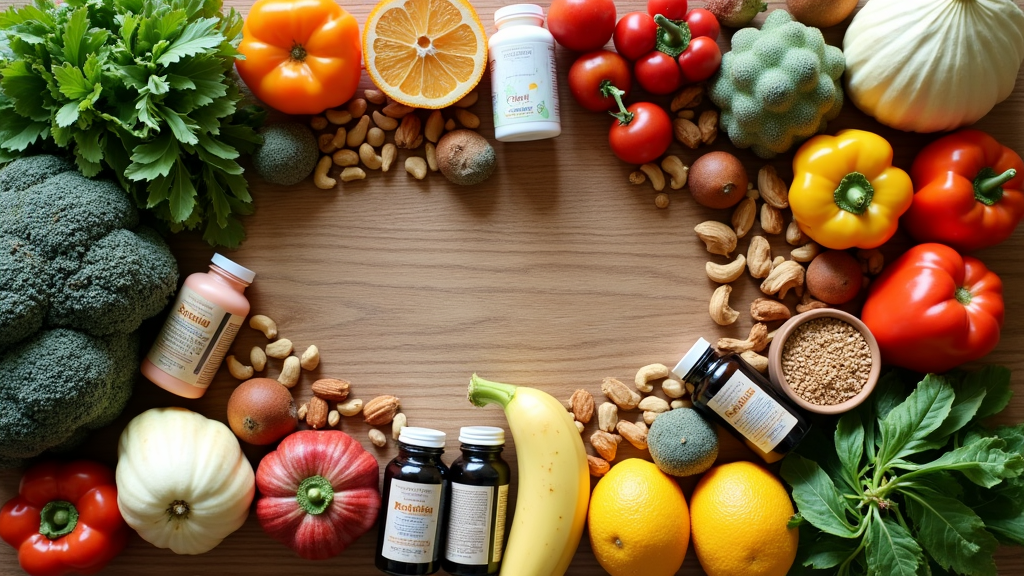Getting all your vitamins in every day isn’t always the easiest thing, especially with a busy schedule or if you’re not a fan of certain foods. I often find myself double-checking what I’ve eaten, realizing I might be missing out on a few nutrients here or there. The good news is you don’t have to overhaul your diet overnight to start making steady progress. In this article, I’ll walk you through the key vitamins to include on your daily to-do list and give you some practical, down-to-earth tips for working them into your routine.

Why Vitamins Matter for Your Daily Routine
Vitamins work behind the scenes to keep your body running well; they really are the unsung heroes of everyday health. They help out with everything from boosting your immune system to making sure you’ve got enough energy to get through a long day. Even if you eat pretty healthy, it can be surprisingly easy to fall short on a few key vitamins simply because modern diets or convenience foods sometimes lack variety.
A lot of the time, I hear from friends or readers who aren’t quite sure which vitamins actually need their attention every day. There’s a lot of noise out there and, honestly, it gets confusing fast. Sticking with the basics and understanding why these vitamins matter can help cut through the clutter and set you up for better health, without getting too technical or overwhelming.
Core Vitamins That Should Be On Your Daily List
While the human body needs a bunch of nutrients, a few vitamins tend to come up again and again for overall wellbeing. I keep an eye on these main players, especially because they touch so many areas of day-to-day health:
- Vitamin D: Known as the “sunshine vitamin,” this one is super important for bones, mood, and immune health. Most people don’t get enough from sunlight alone, so adding it to your daily routine can really help.
- Vitamin C: This classic immune booster also helps with skin healing and acts as an antioxidant. I find it especially useful during cold season or when I’m not eating enough fresh fruits and veggies.
- Vitamin B12: B12 keeps your energy levels sky-high and helps with brain function. I pay attention to B12 if I’m cutting back on meat or skipping animal products, since it’s mostly found in those foods.
- Folate (B9): Important for everything from red blood cell production to supporting healthy DNA, folate is a key vitamin for people of all ages, and even more so for anyone considering pregnancy.
- Vitamin A: Good vision, healthy skin, and a working immune system all rely on vitamin A. If you’re short on brightly colored veggies, it’s worth making sure you’re getting enough.
- Vitamin E: Another antioxidant, vitamin E helps protect your cells and can play a part in keeping your skin looking healthy.
- Vitamin K: This is especially important for blood clotting and bone support, but a lot of folks overlook it because it’s easy to assume you’re getting plenty.
How to Fit Vitamins Into Your Everyday Schedule
I try to work vitamins into my daily habits without making things too complicated. You don’t need to track everything to the last milligram to see real benefits. Here are a few ways I make it easier to tick those boxes throughout the day:
- Eat the Rainbow: Colorful meals almost always mean you’re getting a bigger range of vitamins. I like to build meals around bright veggies (like bell peppers or spinach), fruits (like berries or oranges), and lean proteins.
- Add Supplements When Needed: Sometimes, despite best intentions, life gets in the way. I keep a basic multivitamin in my cupboard for days when I know my meals weren’t the best.
- Make It Routine: Pair vitamins or supplements with something you already do every day. I take mine with breakfast so I don’t forget.
- Check Food Labels: It’s worth a peek at nutrition labels, especially for things like cereal or plant based milk. A lot of brands add vitamins to their products these days.
Things You Should Probably Consider Before Changing Your Vitamin Intake
Before adding vitamins or supplements to your routine, it’s helpful to know a few basics about how your body absorbs them and how they interact with each other. Here’s what I’ve learned from both experts and personal experience:
- Fat Soluble vs. Water Soluble: Vitamins like A, D, E, and K dissolve in fat. I always try to eat these with a bit of healthy fat (like avocado or olive oil) to help my body absorb them. Vitamin C and the B vitamins, on the other hand, are water soluble and can be lost more easily in cooking water. I like to eat raw fruits or lightly steamed veggies to hold onto more nutrients.
- Mind Your Medications: Some vitamins, such as K, can interact with blood thinners. If you’re on any daily meds, checking with a healthcare provider is a smart move.
- Don’t Stack Too Much: More isn’t always better. Going heavy on supplements without a real need can sometimes do more harm than good. It’s always about balance over excess.
Here is a link, this is where I get my vitamins:
https://amzn.to/4ksHtcj
“Here’s a little transparency: Our website contains affiliate links. This means if you click and make a purchase, we may receive a small commission. Don’t worry, there’s no extra cost to you. It’s a simple way you can support our mission to bring you quality content.”
Vitamin D
Getting enough vitamin D can be tricky if you spend a lot of time indoors or live in a cloudy place (I’ve been there, so I know the struggle). I aim to get a little sun every day, but in winter I rely more on fortified foods or a quality supplement. Fatty fish, egg yolks, and fortified milk are good sources too. Many people also notice a mood boost with enough vitamin D, which motivates me to stick with it even in the colder months. While getting vitamin D from the sun is ideal, remember that using sunscreen is also important for skin health—find a balance that works for you.
Vitamin C
Unlike some animals, humans can’t make their own vitamin C, so we have to get it from food. Citrus fruit, strawberries, bell peppers, and broccoli are easy ways to work it into snacks or meals. I keep oranges on my counter so I remember to grab them on busy mornings. If I’m feeling a little run down or fighting off a cold, I’ll purposefully add more vitamin C foods to my day, like squeezing lemon into water or tossing extra peppers into a stir fry.
Vitamin B12
B12 is really important for vegetarians or vegans, since plant foods don’t naturally provide this vitamin. I use fortified plant milks and cereals and, when needed, a sublingual (under the tongue) tablet, which my body seems to absorb well. B12 also supports nerve health, which is another motivation to keep on top of it. If you’re feeling more tired than usual, it’s worth a chat with your healthcare provider to see if B12 could be the missing piece.
Folate (B9)
Leafy greens like spinach, beans, and even some fortified grains make it easy to hit your daily target for folate. It’s something I pay special attention to if I’m planning to grow my family or just want to stay on top of wellness. Folate supports the creation of new cells, so it’s particularly important for women who may become pregnant. Even if you aren’t planning for a family, folate helps with energy and overall health.
Vitamin A
Carrots, sweet potatoes, and dark leafy greens are my go-tos for vitamin A. These foods are easy to grate into salads or blend into smoothies if you’re not a fan of eating them whole. Vitamin A also helps keep your vision sharp and your skin looking fresh, so incorporating it is a win all around. Roasting carrots or making a sweet potato mash are two of my favorite easy meal prep options for getting more vitamin A.
Vitamin E
Nuts and seeds are quick options for adding vitamin E. I like sprinkling sunflower seeds on yogurt or using a handful of almonds as an afternoon snack. Avocados are another great choice and add a creamy texture to salads or toast. Besides skin health, vitamin E offers a dose of antioxidant power, so it helps keep your cells healthy when your schedule gets hectic.
Vitamin K
Kale, broccoli, and Brussels sprouts are all rich in vitamin K. I roast big batches to add to meals throughout the week, which also saves time and makes meal prep less of a hassle. Vitamin K is key for blood clotting and bone strength. Fun fact: even adding herbs like parsley can boost your vitamin K intake. Try mixing roasted veggies with a little olive oil, salt, and a squeeze of lemon for an easy side.
Quick Tips for Building Vitamin Rich Habits
Building new habits can take some time, but starting simple is always less stressful. I set a recurring reminder on my phone and prep a few vitamin rich snacks in advance so they’re easy to reach for on busy days. Here are some quick tips that have worked for me and might work for you too:
- Keep a running grocery list of colorful fruits and veggies
- Batch prep meals with different vegetables for variety
- Use a pill organizer if you’re taking supplements daily
- Share meal planning with a friend or family member to keep it fun
- Try meal prepping chopped veggies and fruit in containers at the start of the week
- Set a goal to try one new produce item each shopping trip, to keep things interesting
- Rotate breakfast or snack options to make sure you’re not missing out on any single vitamin repeatedly
Frequently Asked Questions
I get a lot of questions about daily vitamins, so here are a few that come up most often:
Question: Can I get all my vitamins through food?
Answer: For most people, a balanced diet covers the main vitamins, especially if you mix up your food choices. But depending on your routine, allergies, or diet (like plant based), supplements can help fill gaps.
Question: What’s the best time to take vitamins?
Answer: Fat soluble vitamins (A, D, E, K) are best with food that contains some fat. Water soluble ones (C and B vitamins) can be taken any time, but I find having them with meals helps me remember.
Question: Are gummy vitamins good enough?
Answer: Gummies are easy and taste good, but they might have less actual vitamins and more sugar than regular pills. If you go the gummy route, just check labels for vitamin amounts.
Everyday Ways to Stay On Top of Vitamins
Getting enough vitamins doesn’t have to be a hassle. Focusing on variety and building small habits makes it easier to stay on track. I keep things flexible and don’t stress about being perfect every day; progress over perfection makes all the difference. Make it part of your daily to-do list, and your body will thank you over time. If you have specific health needs or concerns, always check in with a healthcare provider who can help you figure out what’s best for your unique situation. But even a small change, like adding one more colorful veggie to your meal, can give your vitamin routine a real boost.
